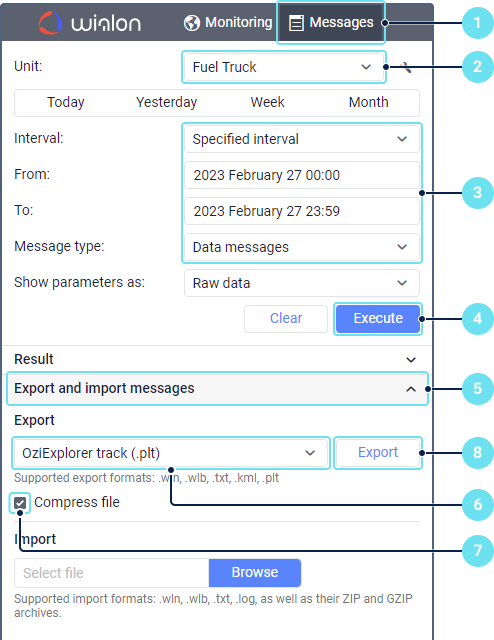Exporting and Importing Messages
You can export or import the messages received from the unit.
The maximum size of an imported file or archive is 64 MB. The archive can contain about 3.5 million messages.
Export
To export messages to the file, follow the steps below.
- Open the Messages tab.
- Select the unit in the drop-down list.
- Specify the request interval and select the type of messages.
- Click Execute. You can request messages in other ways.
- Go to the Export and import messages in the lower-left part of the window.
- Select the format of the resulting file.
- Enable the Compress file option, if you want to create an archive with exported messages.
- Click Export.
Depending on your browser settings, the created file will be opened immediately or you can specify a path for saving the file.

Import
The files saved on the disk which contain messages from the unit can be imported into the units you create.
The supported formats are as follows:
- Raw navigator logs in the GPRMC format defined by the NMEA 0183 specification: search in files with the .txt or .log extensions.
- Wialon messages: search in files with the .wln extension.
- Binary Wialon messages: search in files with the .wlb extension.
To import messages, follow the steps below:
- To speed up and simplify the upload process, compress the message files using ZIP or GZIP utilities beforehand.
Ensure the file with messages is located directly in the archive and not within any subfolders. Messages from files stored in folders inside the archive are not imported.
You can skip this step.
- Go to the Export and import messages in the lower-left part of the window.
- Click on the empty field and select the file from which you want to import messages.
- Click Upload.
Once the upload is complete, the files will be unpacked and processed on the server. You can track this process in the log.
Afterwards, you can request the imported messages and view them in the table. If the messages have been imported by mistake, you can delete them in the table individually or in bulk. You cannot select more than 1000 messages to delete at a time.
Import particularities
- If the parameter name contains more than 40 characters, then the message is imported without this parameter.
- If messages with parameters of digital inputs and outputs are imported in the wln format, then the parameters inN and outN are replaced by avl_input and avl_output, respectively.
- If a message contains the WLNTMNS parameter (time in nanoseconds), its value is regarded as the message generation time. In the table of messages its value is shown rounded to seconds in the Time column.